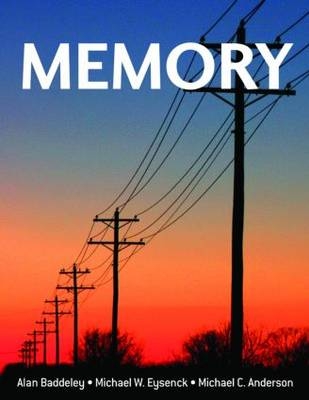
Memory
Psychology Press Ltd (Verlag)
978-1-84872-001-5 (ISBN)
- Titel erscheint in neuer Auflage
- Artikel merken
People seem to be intrigued by memory, and by its sometimes spectacular failure in (for example) people with amnesia. However, students of memory sometimes fail to retain this fascination. The reason is clear: in order to study memory we must carry out carefully-designed experiments, which can seem boring even when they are exciting science. Fortunately, we now know enough about memory to relate laboratory studies to the world beyond. In other words, our scientific knowledge of memory and how it works can help us to explain those aspects of memory that most people find of greatest interest.
This book presents a thorough, accessible and appealing overview of the field, written with students in mind, by some of the world's leading researchers. It starts with a brief overview and explanation of the scientific approach to memory before going on to discuss the basic characteristics of the various memory systems and how they work. Summaries of short-term and working memory are followed by chapters on learning, the role of organization in memory, the ways in which our knowledge of the world is stored, retrieval, and on intentional and motivated forgetting.
The latter half of the book involves the broader application of our basic understanding of memory, with chapters on autobiographical memory, amnesia, and on memory in childhood and aging. After chapters discussing eyewitness testimony and prospective memory, a final chapter addresses an issue of great importance to students – how to improve your memory.
Each chapter of the book is written by one of the three authors, an approach which takes full advantage of their individual expertise, style and personality. This enhances students’ enjoyment of the book, allowing them to share the authors’ own fascination with human memory.
Alan Baddeley is Professor of Psychology at York and one of the world's leading authorities on Human Memory. He is celebrated for devising the ground-breaking and highly influential working memory model with Graham Hitch in the early 1970s, a model which still proves valuable today in recognising the functions of short-term memory. He was awarded a CBE for his contributions to the study of memory, is a Fellow of the Royal Society, of the British Academy and of the Academy of Medical Sciences. In 2012 he was the recipient of the BPS Research Board's Lifetime Achievement Award recognising his outstanding record of personal achievements and significant contributions to the advancement of psychological knowledge. Michael W. Eysenck is Professor of Psychology at Royal Holloway, University of London. Within his research he has focused on various topics within memory research (e.g., levels of processing; distinctiveness). However, for many years his research has focused mainly on anxiety and cognition (including memory). He is the best-selling author of a number of textbooks including Cognitive Psychology: A Student's Handbook, 5th Edition (with Mark T. Keane) (2005), Fundamentals of Cognition (2006), and Fundamentals of Psychology (2009). Michael C. Anderson was the director of the Memory Control Laboratory at the University of Oregon until 2007, and is now Professor of Cognitive Neuroscience at the University of St Andrews in Scotland. His recent work has focused on executive control as a model of motivated forgetting, and has established the existence of cognitive and neurobiological mechanisms by which we can wilfully forget past experiences. This work has appeared in premier science journals such as Nature and Science, and has been featured in Newsweek, US News and NY times, and in a variety of international media.
1. What is Memory? Why Do We Need Memory? One Memory or Many? Theories, Maps, and Models. How Many Kinds of Memory? Sensory Memory. Short-term and Working Memory. Long-term Memory. Everyday Memory. Summary. Further Reading. 2. Short-term Memory. Short-term and Working Memory: What's the Difference? Memory Span. Two Kinds of Memory? Models of Verbal Short-term Memory. Competing Theories of Verbal Short-term Memory. Visuo-Spatial Short-term Memory. Summary. Further Reading. 3. Working Memory. The Multicomponent Model. Imagery and the Visuo-Spatial Sketchpad. The Central Executive. The Episodic Buffer. Individual Differences in Working Memory. Theories of Working Memory. The Neuroscience of Working Memory. Summary. Further Reading. 4. Learning. Rate of Learning. Distributed Practice. Expanding Retrieval. The Importance of Testing. The Importance of Feedback. Motivation to Learn. Repetition and Learning. Implicit Learning. Learning and Consciousness. Explaining Implicit Memory. Learning and the Brain. Implicit Learning in the Brain. Summary. Further Reading. 5. Episodic Memory: Organizing and Remembering. Meaning and Memory. Learning and Predictability. Levels of Processing. The Limits of Levels. Transfer-Appropriate Processing. Why is Deeper Coding Better? Organization and Learning. Memory and the Brain. Summary. Further Reading. 6. Semantic Memory and Stored Knowledge. Semantic Memory Vs. Episodic Memory. Storing Simple Concepts. Organization of Semantic Memory in the Brain. Learning New Concepts. Schemas. Summary. Further Reading. 7. Autobiographical Memory. Why Do We Need Autobiographical Memory? Methods of Study. A Theory of Autobiographical Memory. Psychogenic Amnesia. Organically Based Deficits in Autobiographical Memory. Autobiographical Memory and the Brain. Summary. Further Reading. 8. Retrieval. "On the Tip of the Tongue". The Retrieval Process: General Principles. Factors Determining Retrieval Success. Context Cues. Retrieval Tasks. The Importance of Incidental Context in Episodic Memory Retrieval. Recognition Memory. Source Monitoring. Summary. Further Reading. 9. Incidental Forgetting. A Remarkable Memory. The Fundamental Fact of Forgetting. On the Nature of Forgetting. Factors That Discourage Forgetting. Factors That Encourage Incidental Forgetting. A Functional View of Incidental Forgetting. Summary. Further Reading. 10. Motivated Forgetting. Life is Good, or Memory Makes It So. Terminology in Research on Motivated Forgetting. Factors That Predict Motivated Forgetting Factors That Predict Memory Recovery. Recovered Memories of Trauma: Instances of Motivated Forgetting? Summary. Further Reading. 11. Amnesia. Studying Amnesia. Terminology. Anterograde Amnesia. Theories of Amnesia. Retrograde Amnesia. Traumatic Brain Injury. Summary. Further Reading. 12. Memory in Childhood. Memory in Infants. Developmental Changes in Memory During Childhood. Autobiographical Memory and Infantile Amnesia. Children as Witnesses. Summary. Further Reading. 13. Memory and Aging. Working Memory and Aging. Aging and Long-term Memory. Theories of Aging. The Aging Brain. Alzheimer Disease. Summary. Further Reading. 14. Eyewitness Testimony. Major Factors Influencing Eyewitness Accuracy. Remembering Faces. Police Procedures With Eyewitnesses. From Laboratory to Courtroom. Summary. Further Reading. 15. Prospective Memory. Assessing Prospective Memory. Why Do Plane Crashes Occur? Types of Prospective Memory. Aging and Prospective Memory. Theoretical Perspectives. Summary. Further Reading. 16. Improving Your Memory. Techniques to Improve Memory. Preparing for Examinations. Summary. Further Reading. Glossary. References. Author Index. Subject Index.
| Erscheint lt. Verlag | 5.2.2009 |
|---|---|
| Verlagsort | Hove |
| Sprache | englisch |
| Maße | 189 x 246 mm |
| Gewicht | 1043 g |
| Themenwelt | Kunst / Musik / Theater ► Kunstgeschichte / Kunststile |
| Geisteswissenschaften ► Psychologie ► Allgemeine Psychologie | |
| Geisteswissenschaften ► Psychologie ► Biopsychologie / Neurowissenschaften | |
| ISBN-10 | 1-84872-001-7 / 1848720017 |
| ISBN-13 | 978-1-84872-001-5 / 9781848720015 |
| Zustand | Neuware |
| Informationen gemäß Produktsicherheitsverordnung (GPSR) | |
| Haben Sie eine Frage zum Produkt? |
aus dem Bereich



